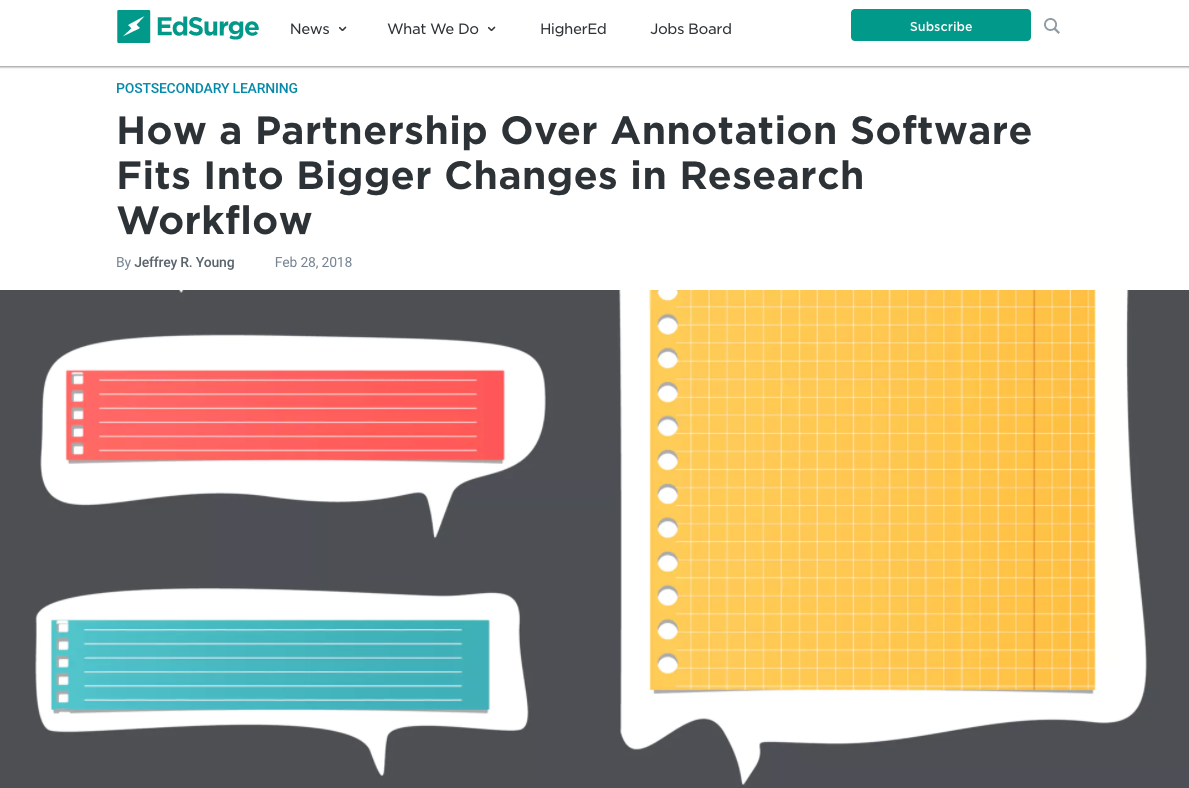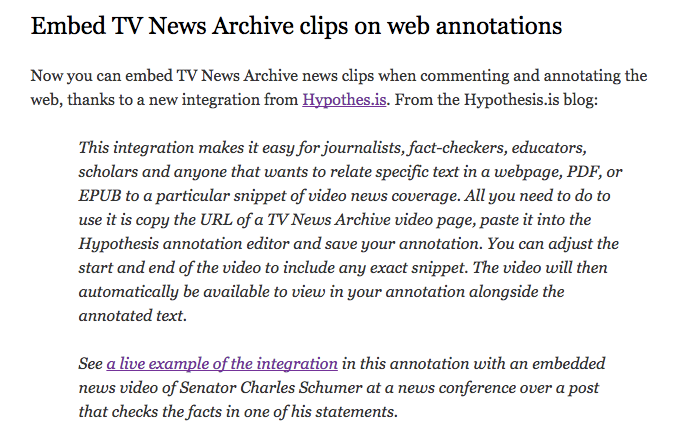Press
Hypothesis in the news.
Read what others are saying about our powerful social annotation solutions. For press inquiries, please contact us.
EdSurge
28 February, 2018
Elsevier, one of the world’s largest publishers of scientific journals, hasn’t been shy about shifting away from just publishing to offering a set of tools for scholars to use throughout the research process. Last week the company took another step along that path by announcing a partnership with a nonprofit named Hypothesis, which makes annotation software that lets readers make margin notes on online articles.
Research Information
21 February, 2018
Elsevier and Hypothesis have announced a collaboration to align annotation capabilities in Elsevier’s Research Products with the emerging ecosystem of interoperable clients and services for annotation based on open standards and technologies. By working together, Elsevier and Hypothesis say they are demonstrating two important shifts in scholarly communications: first, the growing role that annotation plays within the life cycle of research and publication; and second, that data standards and open frameworks are increasingly essential to scientific collaboration and progress.
Naturejobs
12 February, 2018
The next time you feel moved to comment on an article in the open-access online journal eLife, be prepared for a different user experience. On 31 January, eLife announced it had adopted the open-source annotation service, Hypothesis, replacing its traditional commenting system. That’s the result of a year-long effort between the two services to make Hypothesis more amenable to the scholarly publishing community.
Columbia Journalism Review
1 February, 2018
THE EARTH IS 15 YEARS AWAY from a “mini ice age” “that will cause bitterly cold winters during which rivers such as the Thames freeze over.” That was the claim that kicked off an article in The Telegraph in July 2015.
Digital Media and Learning Research Hub
4 December, 2017
Now, I will be the first to admit that the writing published in scholarly journals often suffers from overuse of jargon and density of language that can render it of little use to educators — that’s a topic for another post. But, for those of us whose careers depend upon publishing in these journals AND are striving to write in clear and relevant ways for multiple audiences, it is frustrating to feel that we are giving a monologue that may be heard only by a few other scholars. This is why I’m so grateful for the experience of having an article that I co-wrote with friend and colleague, Antero Garcia, publicly available on the web annotation platform, Hypothesis, through a partnership between the National Writing Project (NWP) and Marginal Syllabus.
Internet Archive Blogs
2 November, 2017
Now you can embed TV News Archive news clips when commenting and annotating the web, thanks to a new integration from Hypothes.is.
(GIGA)Blog
31 October, 2017
Over 200 participants spent three eventful days in Berlin last week to discuss ideas, ongoing projects and future developments around Open Science. As an appropriate location to demonstrate the benefits of breaking down barriers, the motto of FORCE2017 was “Changing the culture”. While most of the GigaScience team was in Shenzhen for ICG, Hans Zauner was on hand in what is one of our favourite meetings.
Steel Wagstaff
28 October, 2017
For the past few years, I’ve been working to improve how content experts at my university can write, develop, and publish open educational resources. Early in 2016, I published my own set of core principles for an authoring & publishing tool. For the last two years, I’ve spent a lot of time thinking about how to better accomplish the last two principles on that original list, namely how to incorporate multimedia, web annotation, and interactivity into our texts, and how to ensure that we can incorporate these texts into various learning management systems, complete with assessment and learning analytics capabilities.
AGU Editors' Vox
14 September, 2017
AGU journals will incorporate open source software to facilitate dialog among reviewers, editors and authors during peer review.
Inside Higher Ed
9 August, 2017
In recent years, a movement to make research more transparent has taken root in the social sciences. Innovative platforms and technical tools empower scholars to provide a more complete picture of their research.









